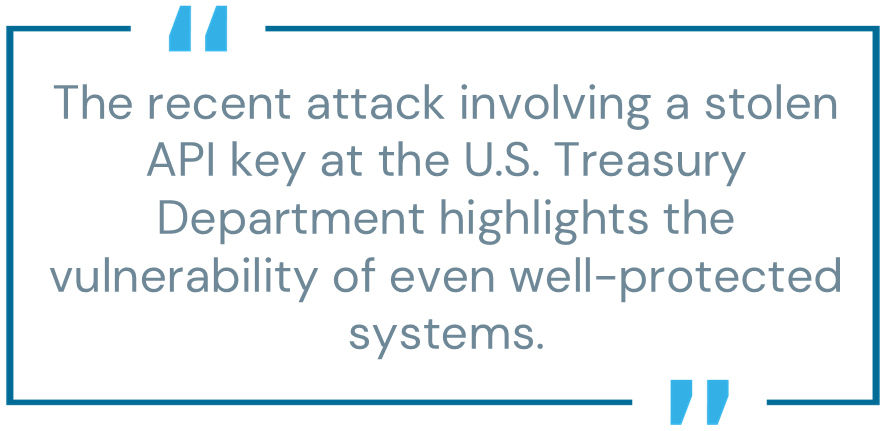
Kubernetes powers modern application deployments, yet safeguarding its secrets remains a formidable challenge. In a 2024 report, IBM estimated that 16% of data breaches stemmed from compromised credentials, resulting in significant financial losses.
The recent attack involving a stolen API key at the U.S. Treasury Department highlights the vulnerability of even well-protected systems. For Kubernetes users, this underscores the importance of robust secrets management, and research indicates that organizations are increasingly prioritizing the security of Kubernetes secrets.
That’s why evaluating whether your current practices adequately protect your cluster’s sensitive information is crucial.

Secrets Protection is Not Secrets Management
Kubernetes, designed for dynamic, distributed applications, presents a singular challenge in secure secrets management. While powerful, it lacks built-in comprehensive secrets management capabilities. For many security engineering professionals, it often comes with complete bewilderment to discover that the secrets applications use to authenticate communications (certificates, API Keys, tokens and passwords) are by default stored in Kubernetes clusters, unencrypted and for that reason, potentially vulnerable to compromise and attack.
Storing secrets in plain text is clearly not a security norm that many organizations will feel comfortable about, yet the practice has become very normal for developer teams. We see this happening because developers want their workflows to be automated and align with this. Kubernetes offers a native cluster resource—Kubernetes Secrets—to automatically store all secrets so they are accessible to the applications that must use them.
In Kubernetes, securing data in the cluster is often treated as part of a broader security framework that relies on Role-Based Access Control (RBAC) to regulate access to cluster resources, including secrets. In the context of secrets security, you might call this “secrets protection” rather than “secrets management.”
Organizations, particularly in regulated sectors, must comply with strict security and audit requirements. Ensuring that Kubernetes environments meet these standards requires meticulous secrets management. Without a proper strategy, Kubernetes environments face serious security risks:
- RBAC misconfigurations can inadvertently grant unauthorized users or workloads access to critical secrets.
- Persistent, high-privilege secrets become prime targets for attackers if not properly managed.
- Lack of centralized oversight increases the risk of secrets exposure and compromise.
Better Platform Performance through Secrets Management
Building effective secrets management in Kubernetes requires a developer-centric approach that seamlessly integrates into automated workflows and is policy-driven to ensure strong security outcomes. Platform teams play a vital role in finding the right approach for secrets management. Tracking secret usage and injection across dynamically scaling workloads, managing diverse access requirements and combating overall secrets sprawl demand robust solutions.
Modern techniques like just-in-time (JIT) secret provisioning, secretless architectures and robust workload identity systems offer significant advantages over traditional, less secure methods. By understanding the value of these strategies in the context of automation, platform engineers can play a crucial role in preventing secrets from being leaked, compromised or mismanaged. This will lead directly to reducing their organization’s attack surface and improve the overall resilience of the Kubernetes platform by protecting critical applications from security incidents.
Without a structured approach that works in hand with the dynamic nature of developer workflows, secrets management becomes detached from real-time security needs, increasing risks and vulnerabilities if secrets are exposed.
The Key Aspects of Secrets Management
An effective structured approach to improve Kubernetes credential security should assess current secrets management practices, identify gaps and prioritize where remediation efforts should focus first.
This assessment should be done in the context of five important aspects that represent the core capabilities for effective secrets management in Kubernetes:
- Secrets distribution and access
- Lifecycle management
- Identity
- Governance
- Compliance
Understanding these aspects alongside essential topics such as secure storage, fine-grained access control, auditing, lifecycle management, multi-environment governance and proactive scanning to prevent unauthorized access is a crucial starting point for better secrets management in Kubernetes.
Building on a solid foundation of secrets management, platform teams can enhance Kubernetes security by adopting modern approaches like just-in-time secrets and secretless brokers. Leveraging technologies like SPIFFE (Secure Protection Identity Framework for Everyone) for workload identity further strengthens this security posture.
Maturity Model for Kubernetes Secrets Management
While Kubernetes adoption continues growing at an incredible rate, the system does not, unfortunately, come with its own security framework—security is, therefore, a shared responsibility. Many platform engineering teams already understand this, yet they may not have prioritized secrets management as a key concern.
As Kubernetes continues to evolve as a cornerstone of modern application deployments, the importance of robust secrets management cannot be overstated. By adopting a comprehensive approach to secrets management, organizations can significantly enhance their security posture, reduce risks and ensure the integrity of their applications.
If you’re interested in diving deeper into this critical aspect of Kubernetes security, our whitepaper, “Better Secrets Management in Kubernetes—A Practical Maturity Model for Securing Secrets and Reducing Risks Across Kubernetes Environments,” offers valuable insights and practical strategies. This resource is particularly useful for platform engineers, cloud security architects and anyone responsible for securely hosting applications in Kubernetes.
Steve Judd is a technical director specializing in Kubernetes security at CyberArk.























